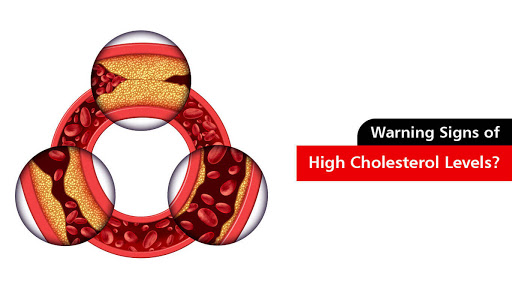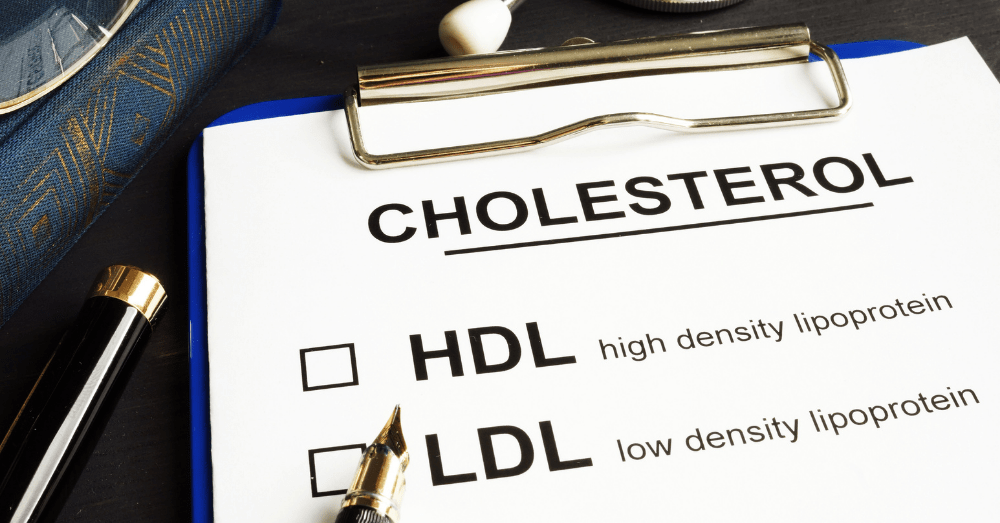What is High cholesterol?
Cholesterol is a wax-like substance discovered in your blood. Your body requires cholesterol to build healthy cells, but high levels of cholesterol may raise your risk of heart disease.
With high cholesterol, you could develop fatty deposits in your blood vessels. Ultimately, these deposits grow, making it hard for enough blood to flow through your arteries. Sometimes, those deposits could break unexpectedly and form a clot that causes a heart attack or stroke.
High cholesterol could be hereditary, but it is usually the result of unhealthy lifestyle choices, which make it preventable and treatable. A healthy diet, regular exercise, and sometimes medication could help lower high cholesterol.

High cholesterol Symptoms
High cholesterol is not symptomatic. A blood test is the only way to find if you have it.
When should you see a doctor?
Ask your doctor or primary care physician if you should have a cholesterol test. Children and young adults with no risk factors for heart disease are generally tested once between the ages of 9 and 11 and again between the ages of 17 and 19. Retesting for adults with no risk factors for heart disease is generally done every 5 years.
If your test results are not within desirable ranges, your doctor or primary care physician may suggest more-frequent measurements. Your doctor or primary care physician may also recommend more-frequent tests if you have a family history of high cholesterol, heart disease, or other risk factors, for example, smoking, diabetes, or high blood pressure.
High cholesterol Causes
Cholesterol is passed from the blood, tied to the proteins. This combination of proteins and cholesterol is known as a lipoprotein. There are different kinds of cholesterol, based on what the lipoprotein carries. They are:
- Low-density lipoprotein (LDL) – Low-density lipoprotein (LDL), or “bad” cholesterol, transports cholesterol particles throughout your body. Low-density lipoprotein (LDL) cholesterol accumulates in the walls of your arteries, making them hard and confined.
- High-density lipoprotein (HDL) – High-density lipoprotein (HDL), or “good” cholesterol, picks up excess or extra cholesterol and takes it back to your liver.
A lipid profile also generally measures triglycerides, a type of fat in the blood. Having a high triglyceride level could also increase your risk of heart disease.
Factors or determinants you could control for example inactivity, obesity, and an unhealthy diet contribute to high cholesterol and low high-density lipoprotein (HDL) cholesterol. Factors or determinants beyond your control may play a role, too. For instance, your genetic makeup may keep cells from removing low-density lipoprotein (LDL) cholesterol from your blood efficiently or cause your liver to produce too much cholesterol.
High cholesterol Risk factors
Factors that could increase your risk of bad cholesterol include:
- Poor diet – Eating saturated fat, discovered in animal products, and trans fats, found in some commercially baked cookies and crackers and microwave popcorn, could raise your cholesterol level. Foods that are high in cholesterol, for example, red meat and full-fat dairy products, will also increase your cholesterol.
- Obesity – Having a body mass index (BMI) of 30 or higher puts you at risk of high cholesterol.
- Lack of exercise – Exercise helps boost your body’s high-density lipoprotein (HDL), or “good,” cholesterol while increasing the size of the particles that make up your low-density lipoprotein (LDL), or “bad,” cholesterol, which makes it less harmful.
- Smoking – Cigarette smoking affects the walls of your blood vessels, making them more vulnerable to accumulate fatty deposits. Smoking may also lower your level of high-density lipoprotein (HDL), or “good,” cholesterol.
- Age – Because your body’s chemistry changes as you grow older, your risk of high cholesterol climbs. For example, as you age, your liver becomes less able to remove low-density lipoprotein (LDL) cholesterol.
- Diabetes – High blood sugar contributes to higher levels of a dangerous cholesterol called very-low-density lipoprotein (VLDL) and lower high-density lipoprotein (HDL) cholesterol. High blood sugar also affects the lining of your arteries.
High cholesterol Complications
High cholesterol could cause a dangerous collection of cholesterol and other deposits on the walls of your arteries (atherosclerosis). These deposits (plaques) could lower blood flow through your arteries, which could cause complications, like:
- Chest pain – If the arteries that supply your heart with blood (coronary arteries) are damaged, you might have chest pain (angina) and other symptoms of coronary artery disease.
- Heart attack – If plaques tear or rupture, a blood clot could form at the plaque-rupture site obstructing the flow of blood or breaking free and plugging an artery downstream. If blood flow to a portion of your heart stops, you will have a heart attack.
- Stroke – Identical to a heart attack, a stroke happens when a blood clot prevents blood flow to part of your brain.
High cholesterol Prevention
The same heart-healthy lifestyle changes that could lower your cholesterol could help stop you from having high cholesterol in the first place. To help stop high cholesterol, you could:
- Eat a low-salt diet that focuses on fruits, vegetables, and whole grains
- Restrict the number of animal fats and use good fats in moderation
- Lose extra pounds and keep a healthy weight
- Quit smoking
- Exercise on most days of the week for at least thirty minutes
- Drink alcohol within limits, if at all
- Handle stress
High cholesterol Diagnosis
A blood test to check cholesterol levels known as a lipid panel or lipid profile generally reports:
- Total cholesterol
- Low-density lipoprotein (LDL) cholesterol
- High-density lipoprotein (HDL) cholesterol
- Triglycerides a kind of fat in the blood
For the most accurate measurements, do not eat or drink anything (other than water) for nine to twelve hours before the blood sample is taken.

Children and cholesterol testing
For most children, the National Heart, Lung, and Blood Institute suggests one cholesterol screening test between the ages of 9 and 11 and another cholesterol screening test between the ages of 17 and 21.
If your child has a family history of early-start heart disease or a personal history of obesity or diabetes, your primary care physician may suggest earlier or more-frequent cholesterol testing.
High cholesterol Treatment
Lifestyle alterations for example exercising and eating healthy nutrition are the first line of defense against high cholesterol. But, if you have made these important lifestyle changes and your cholesterol levels remain high, your primary care physician may suggest medication.
The option of medication or a combination of medications depends on various factors, including your personal risk factors, your age, your health, and possible drug side effects. Common options include:
- Statins – Statins stop a substance your liver requires to make cholesterol. This causes your liver to flush cholesterol out of your bloodstream. Statins could also help your body reabsorb or imbibe cholesterol from accumulated deposits on your artery walls, possibly reversing coronary artery disease.
Options or alternatives involve atorvastatin (Lipitor), fluvastatin (Lescol XL), lovastatin (Altoprev), pitavastatin (Livalo), pravastatin (Pravachol), rosuvastatin (Crestor) and simvastatin (Zocor). - Bile-acid-binding resins – Your liver uses cholesterol to make bile acids, a substance required for digestion. The medications cholestyramine (Prevalite), colesevelam (Welchol) and colestipol (Colestid) reduce cholesterol indirectly by attaching to bile acids. This prompts your liver to use excess or extra cholesterol to make more bile acids, which lowers the level of cholesterol in your blood.
- Cholesterol absorption inhibitors – Your small intestine absorbs or imbibes the cholesterol from your diet and releases it into your blood vessels. The drug ezetimibe (Zetia) helps lower blood cholesterol by limiting the absorption of dietary cholesterol. Ezetimibe could be used with a statin drug.
- Injectable medications – A newer class of drugs, called PCSK9 inhibitors, could help the liver absorb or imbibe more low-density lipoprotein (LDL) cholesterol which reduces the amount of cholesterol circulating in your blood. Alirocumab (Praluent) and evolocumab (Repatha) may be used for people who have a genetic condition that causes very high levels of low-density lipoprotein (LDL) or in people with a history of coronary illness who have an intolerance to statins or other cholesterol medications.
Medications for high triglycerides
If you also have high triglycerides, your primary care physician may prescribe:
- Fibrates – The medications fenofibrate (TriCor, Fenoglide, others) and gemfibrozil (Lopid) lower your liver’s production of very-low-density lipoprotein (VLDL) cholesterol and speed the elimination of triglycerides from your bloodstream. Very-low-density lipoprotein (VLDL) cholesterol contains mostly triglycerides.
Using fibrates with a stain could increase the risk of statin side effects. - Niacin – Niacin restricts your liver’s ability to produce low-density lipoprotein (LDL) and very-low-density lipoprotein (VLDL) cholesterol. But niacin does not offer additional benefits over statins. Niacin has also been linked to liver damage and strokes, so most primary care physicians now suggest it only for people who cannot take statins.
- Omega-3 fatty acid supplements – Omega-3 fatty acid supplements could help reduce your triglycerides. They can be obtained by prescription or over the counter.
If you choose to take over-the-counter supplements, get your primary care physicians OK. Omega-3 fatty acid supplements can affect other medications you are taking.
Tolerance varies
Tolerance of medications differs from person to person. The common side effects of statins are muscle pains and muscle damage, reversible memory loss and confusion, and high blood sugar. If you decide to take cholesterol medication, your primary care physician may suggest liver function tests to monitor the medication’s effect on your liver.

Children and cholesterol treatment
Diet and exercise are the best first treatment for children age 2 years and older who have high cholesterol or who are obese. Children age 10 and older who have extremely high cholesterol levels may be prescribed cholesterol-lowering drugs, for example, statins.
If you or anyone you know is suffering from high cholesterol, our expert providers at Zenith Injury Relief & Wellness Clinic will take care of your health and help you recover.
Call 972-210-0033 to schedule your appointment , and begin living your life pain-free.
